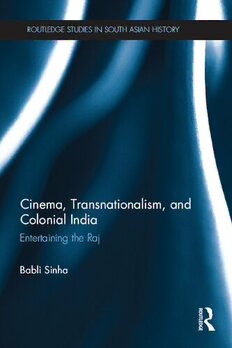
Cinema, Transnationalism, and Colonial India: Entertaining the Raj PDF
Preview Cinema, Transnationalism, and Colonial India: Entertaining the Raj
Cinema, Transnationalism, and Colonial India Through the lens of cinema, this book explores the ways in which the United States, Britain, and India have impacted each other politically, culturally, and ideologically. It argues that American films of the 1920s posited alternative notionsofwhitenessandtheWesttothatofBritain,whichstoodfordemocracy and social mobilityeven at a time ofvirulent racism. The book examines the impact that the American cinema had on Indian filmmakers of the period, who were integrating its conventions with indigenous artistictraditionstoarticulateanIndianmodernity.ItconsidersthewayAmerican films in the 1920s presented an orientalist fantasy of Asia, which occluded the harshrealitiesofanti-Asiansentimentandlegislationintheperiodaswellasthe excitingengagementofanti-imperialactivistswhosoughttousetheUnitedStates asthebaseofatransnationalnetwork.ThebookgoesontoanalyzetheAmerican “empire films” of the 1930s, which adapted British narratives of empire to representthe United States as anew globalparadigm. Presenting close readings of films, literature and art from the era, the book engages cinema studies with theories of post-colonialism and transnationalism, and provides a novel approach to the study ofIndiancinema. Babli Sinha is Assistant Professor of English and Director of Media Studies at Kalamazoo College, USA. She is the Editor of South Asian Transnationalisms: Cultural Exchangein the TwentiethCentury (Routledge,2011). Routledge studies in South Asian history 1 TheSocialHistoryofHealthand 8 TheStateandGovernanceinIndia MedicineinColonialIndia Thecongressideal EditedbyBiswamoyPatiandMark WilliamF.Kuracina Harrison 9 Gandhi’sSpinningWheelandthe 2 DecolonizationinSouthAsia MakingofIndia Meaningsoffreedominpost-indepen- RebeccaBrown denceWestBengal,1947–52 10 GenderandRadicalPoliticsinIndia SekharBandyopadhyay MagicmomentsofNaxalbari(1967– 3 HistoriographyandWriting 1975) PostcolonialIndia MallarikaSinhaRoy NaheemJabbar 11 Bureaucracy,Communityand 4 Nationalism,EducationandMigrant InfluenceinIndia Identities Societyandthestate,1930s–1960s TheEngland-Returned WilliamGould SumitaMukherjee 12 AHistoryofStateandReligionin 5 Medicine,RaceandLiberalismin India BritishBengal IanCopland,IanMabbett,AsimRoy, Symptomsofempire KateBrittlebankandAdamBowles IshitaPande 13 HinduMahasabhainColonialNorth 6 RadicalPoliticsinColonialPunjab India,1915-1930 Governanceandsedition Constructingnationandhistory ShaliniSharma PrabhuBapu 7 TheGreatRebellionof1857inIndia 14 Cinema,Transnationalism,and Exploringtransgressions,contestsand ColonialIndia diversities EntertainingtheRaj BiswamoyPati BabliSinha Cinema, Transnationalism, and Colonial India Entertaining the Raj Babli Sinha Firstpublished2013 byRoutledge 2ParkSquare,MiltonPark,Abingdon,OxonOX144RN SimultaneouslypublishedintheUSAandCanada byRoutledge 711ThirdAvenue,NewYork,NY10017 RoutledgeisanimprintoftheTaylor&FrancisGroup,aninforma business q2013BabliSinha TherightofBabliSinhatobeidentifiedasauthorofthisworkhasbeen assertedinaccordancewithsections77and78oftheCopyright,Designs andPatentsAct1988. Allrightsreserved.Nopartofthisbookmaybereprintedorreproducedor utilisedinanyformorbyanyelectronic,mechanical,orothermeans,now knownorhereafterinvented,includingphotocopyingandrecording,orin anyinformationstorageorretrievalsystem,withoutpermissioninwriting fromthepublishers. Trademarknotice:Productorcorporatenamesmaybetrademarksor registeredtrademarks,andareusedonlyforidentificationandexplanation withoutintenttoinfringe. BritishLibraryCataloguinginPublicationData AcataloguerecordforthisbookisavailablefromtheBritishLibrary LibraryofCongressCataloging-in-PublicationData Sinha,Babli. Cinema,transnationalism,andcolonialIndia:entertainingtheRaj/ BabliSinha. pagescm.–(RoutledgestudiesinSouthAsianhistory) Includesbibliographicalreferencesandindex. 1.Motionpictures–India–Foreigninfluences.2.Motionpictureindustry– India–History.3.Motionpictures–UnitedStates–Influence.4.Motion pictures–GreatBritain–Influence.5.Motionpictures,Indic.6.Motion picturesandtransnationalism.I.Title. PN1993.5.I8S575652013 791.43’0954–dc23 2012038346 ISBN:978-0-415-52849-8(hbk) ISBN:978-0-203-55899-7(ebk) TypesetinTimesNewRoman byOKSPrepressServices,Chennai,India For my parents, Mita and Provat Sinha This page intentionally left blank Contents Acknowledgments ix 1 Historicizing entertainment 1 2 Modernity, identity, and the consequences of Americanism 13 Regulating cinema 13 Space andsegregation 15 Misrepresentationand misunderstanding 21 Industry practices and political responses 29 3 The hybrid sensorium ofIndianfilm 35 Cosmopolitanaesthetics 35 Comedy andmodernity 40 Spiritual and material worlds 48 Nationalism and adventure 58 4 “No place for milksops”: narrating Indians in the United States 66 Empire, migration, and assimilation 66 The Indian inliterature andfilm 69 America and empire 74 Cultivating solidarity 80 5 Empirefilmsand the dissemination ofAmericanism in colonial India 91 Genreand geography 91 Cultural imperialismand a new Americanism 93 viii Contents The individualasdefender ofimperial ideals 95 American trade and brotherhood 101 Mediationand modernization 108 Epilogue 116 Notes 119 Bibliography 141 Index 155 Acknowledgments This book would not have been possible without the supportive staff of many libraries and archives, especially the National Archives in New Delhi, the National Film Archives of India in Pune, the British Library in London, the National Archives in Kew, the Margaret Herrick Library and the University of Southern California Cinema-Television Library in Los Angeles, the University of Chicago’s Regenstein Library and Film Studies Center, and the Center for Research Libraries in Chicago. Grants and fellowships permitted my travel to these archives. I received generous travel grants from the University of Chicago’s Department of English Language and Literature, Department of CinemaandMediaStudies,andtheDivisionoftheHumanities.TheJaneEllison Dissertation Fellowship at the University of Chicago was particularly helpful during the final phase of the dissertation. The UCLA Mellon Postdoctoral program in the Humanities made possible the conceptual development and additional archival research necessary for transforming the dissertation into a book. A leave at Kalamazoo College and funds from the Marlene Crandell FrancisAssistantProfessorshipintheHumanitiesenabledthecompletionofthe final chapters. Iamindebtedtothecarefulreadersoftheiterationsofthisbook,especiallymy dissertation advisers, Dipesh Chakrabarty, Tom Gunning, James Lastra, and SareeMakdisi,andmymentorsatUCLA,Franc¸oiseLionnetandShu-meiShih. Arguments were challenged and clarified with the insight of Ali Behdad, Dilip Gaonkar,PriyaJaikumar,andVinayLalaswellasMellonfellowsEula`liaMoles, Elsa Chen, Alessandra DiMaio, Kris Manjapra, and Sonali Pahwa. Workshops wereinvaluableformeandincludetheComparativeColonialismsWorkshopand the Mass Culture Workshop at the University of Chicago and the workshops, seminars,andconferencessponsoredbytheUCLAMellonPostdoctoralProgram in the Humanities: Cultures in Transnational Perspective. I am indebted to the participants in these events. I am also thankful to my colleagues at Kalamazoo College and to Dorothea Schaefter and Jillian Morrison at Routledge for their enthusiasm about my project. The anonymous reviewers provided important suggestions for sharpening arguments. I am grateful to Duke University Press, Biblio, and Taylor & Francis for granting permission to reproduce portions of
